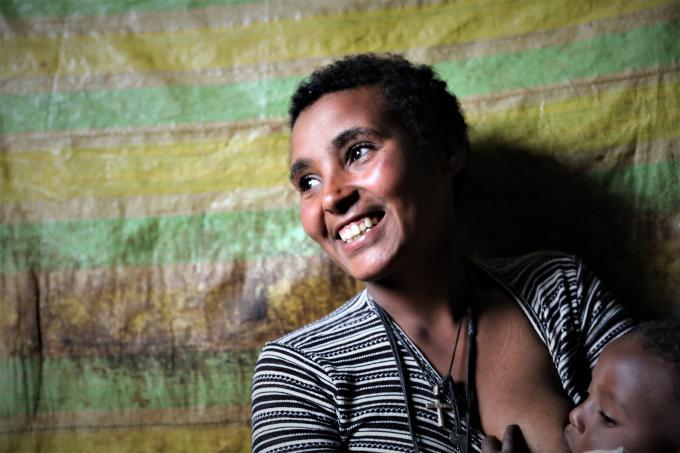You are what you eat: Story of a Newlywed Couple and Son

Alemtsehay breastfeeds her Son, Temesgen.
150 km from Bahir Dar (500 km from Ethiopia’s capital Addis Abeba) live Alemu and Alemtsehay, a young lively couple and the parents of a year and a half toddler named Temesgen. Since the married couple do not own a farmland, they work on someone else’s farm to get a quarter of the produce.
It has been a year now since this family of three became beneficiaries of Save the Children’s project Growth through Nutrition (GNT) which provided them with two sheep, six chicken and seeds for five types of vegetable (cabbage, carrots, pigeon pea, collard greens and Swiss chard). Besides benefitting from the material support, they also take part in the Enhanced Community Conversation (ECC) sessions organized by GTN. Moreover, Almetsehay is a member of a savings group also established by the project. Through the discussions from the various ECC sessions, Alemtsheay has now awareness about the first one thousand days which are first 1000 days of life (from pregnancy to two years). In the ECC sessions, they discuss among other things, the sunflower stages – the four stages of the first one thousand days, namely seed, sprout, bud and flower. “I come back home and discuss these issues with him,” she says, referring to her husband.
Although she was not on a pregnancy diet when she was expecting, she now knows how the child could benefit from the nutritious food pregnant women could take. Alemtsehay is fully aware of the importance of breastfeeding as well. “If in the future we decide to get another child, I will remember to take nutritious food when I get pregnant,” she says. They also learn in the ECC sessions about the causes and effects of stunting and malnourishment. Thanks to the support from the project, the young couple are now mindful of preparing supplementary foods for their toddler which comprises of grains, vegetables, and eggs in Temesgen’s diet.
Apart from improving their intake of nutritious food, the newlywed couple also put some of their ingathering to market. That way they don’t have to sell assets to cover their other living expenses. They also use the money to buy food items they don’t produce and add items to their nutritious menu. “Our dietary diversity was limited to one or two staple foods, but now, not only do we have dietary diversity but we also earn money by putting some of our vegetable on the market”, says Alemu. Almetsehay and Alemu have high hopes of using the eggs from their chicken for household consumption. “Despite our earlier enrollment in the program, we got the chicken only a month and a half ago,” comments Almetsehay, feeding the five hens and a cock which were provided to them at the end of May
2018. “But I could not have afforded buying these chicken anyway if it was not for the project,” she adds gratefully. The two sheep on the other hand, have multiplied and the family now owns three sheep.
The happily married couple understand how milk is an important element in a nutritious daily menu. And that is why they hope to sell the sheep and get a cow with support from the project. “The child knows no taste of milk still,” says Alemu. Temesgen is now in the flower stage of the sunflower stages, and eats what his parents eat plus oats specially prepared for him. Lucky for Temesgen, when GTN started to operate in this agriculturally productive northern region of Ethiopia where undernutrition has been rampant for decades, he was a mere five-month old infant. Still in his first one thousand days, he is enjoying project’s support that has already started to come to fruition in reducing stunting in the region where nearly one in two children under five are stunted.
“We are committed to send our son Temesgen to school and we want him to become a doctor,” says Alemu.
Growth through Nutrition is a multi-sector nutrition and WASH project funded by United States Agency for International Development (USAID) and it aims to improve the nutritional status of women, young children, and adolescents in its four operational regions of Ethiopia. To date, GTN enrolled 719 ECC groups and supported 7,281 beneficiaries with agricultural inputs. These enthusiastic, progressive individuals are knowledgeable. They understand nutrition in a way most city folks don’t, and are eager to put into practice what they’ve learned. They are pioneers and potential change agents for their community at large.
 Ethiopia
Ethiopia